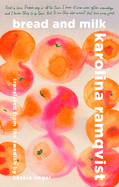
Novelist Karolina Ramqvist's vivid memoir Bread and Milk, elegantly translated from Swedish by Saskia Vogel, depicts in moving detail the relationships the author has with important members of her family, seen through the lens of her memories of food. Whether eating in one go all the tangerines her mother bought at the store or whipping up an ill-fated rice pudding for her daughter, all the episodes show the dominant role that food has occupied in Ramqvist's life.
She writes, "I've found myself thinking that all lovers of food must be abandoned children because, in most families anyway, food is the only thing within reach for a child who can't handle all that it means to exist." The increasingly sinister nature of the relationship Ramqvist had with food creeps up on readers. First, she centers the extent of her childhood isolation when living with her mother, whose job, social commitments, and romantic adventures frequently took her out of the house, leaving the girl alone into the nighttime hours. By the middle of the memoir, Ramqvist's full-blown eating disorder--or as she thought of it at one time, addiction--is clearly on display.
Ramqvist's telling is focused more on her development and self-knowledge rather than the physical effects of disordered eating or a difficult 12-step journey. Still the trajectory is one of recovery. At its heart, Bread and Milk is a sensual personal reflection, filled with the love Ramqvist (The White City) has for the people in her life, and inextricably tied to her memories of food and its preparation. A moving, beautifully crafted and translated journey about what sustains and connects us. --Elizabeth DeNoma, executive editor, DeNoma Literary Services, Seattle, Wash.

